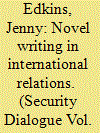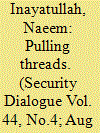| Srl | Item |
| 1 |
ID:
122650


|
|
|
|
|
| Publication |
2013.
|
| Summary/Abstract |
This article is a commentary on Elizabeth Dauphinee's book The Politics of Exile. Its focus is on her displacement - her dual sojourn that is, on the one hand, a physical migration (from Canada to Bosnia for research) and, on the other, a genre migration (from academic to literary writing). The main part of the analysis situates Dauphinee's contribution among the Balkans War reflections of diverse exilic artists from the former Yugoslavia (writers and a film director), and the article ends by situating Dauphinee's method within two analytics: Jacques Rancière's concept of indisciplinarity and Cesare Casarino's concept of philopoesis.
|
|
|
|
|
|
|
|
|
|
|
|
|
|
|
|
| 2 |
ID:
122648


|
|
|
|
|
| Publication |
2013.
|
| Summary/Abstract |
Prompted by Elizabeth Dauphinee's The Politics of Exile, the article explores the political potential of novel ways of writing in international relations. It begins by examining attempts to distinguish between narrative writing and academic writing, fiction and non-fiction, and to give an account of what narrative might be and how it might work. It argues that although distinctions between narrative writing and academic writing cannot hold, there are nevertheless ways of judging the practical political effects that writing can produce. It briefly examines feminist, postcolonial and other international relations scholars who collect other people's stories or tell their own, and points to an instructive body of work in fiction and literary non-fiction beyond the discipline. It argues that writing that disrupts linear forms of temporality and instead inhabits 'trauma time' can open the possibility of an aesthetic political practice, and suggests that we foster such a creative practice in international relations.
|
|
|
|
|
|
|
|
|
|
|
|
|
|
|
|
| 3 |
ID:
122649


|
|
|
|
|
| Publication |
2013.
|
| Summary/Abstract |
The promise of Elizabeth Dauphinee's The Politics Of Exile lies most prominently in its ability to exile us from an international relations scholarship trapped in an economy of colonial truth. It is this economy of colonial truth, also readable as Europe, that produces an international relations scholarship and pedagogy that not only self-consciously cleanses the academic world of other ways of learning and knowing but also induces an indifference or an instrumental orientation in its recipients. Reading Dauphinee's text alongside the transcript of a child detainee's interrogation in Guantánamo Bay as well as Chinua Achebe's Things Fall Apart, this article explores the ethical relations of responsibility that emerge as Dauphinee's novel sets out to move writers, researchers, and teachers of international relations away from an economy of colonial truth.
|
|
|
|
|
|
|
|
|
|
|
|
|
|
|
|
| 4 |
ID:
122651


|
|
|
|
|
| Publication |
2013.
|
| Summary/Abstract |
The achievements of Elizabeth Dauphinee's (2013) The Politics of Exile are highlighted by means of two juxtapositions. First, Dauphinee's book invites a contrast to novels because it takes the form of a story. Specifically, Dauphinee's portrait of the vilified 'Serbs' is compared with how the Taliban are treated in Khalid Hosseini's The Kite Runner and Nadeem Aslam's The Wasted Vigil. Second, The Politics of Exile is examined as it emerges from Dauphinee's efforts to overcome the limits of her more academic work. The advantages of Dauphinee's approach relative to our standard research are presented along five dimensions: the responsibility of closure, the purpose of narration, the transparency of the message, how the work is shown, and the role of generosity. This article critiques Dauphinee's silence on the purpose of travel. It closes by suggesting what social theory can glean from The Politics of Exile. Social theorists can learn how to theorize more systematically, to weigh the relationship between the form and content in writing more judiciously, and to probe the deeper purposes of our intellectual life-work more fully.
|
|
|
|
|
|
|
|
|
|
|
|
|
|
|
|
| 5 |
ID:
122653


|
|
|
|
|
| Publication |
2013.
|
| Summary/Abstract |
This article engages in a reflection on the author's recently published book, The Politics of Exile. Of central concern are questions surrounding how restrictions on writing constrain the creative process; how we can access the lives and deaths of those with whom we share no temporal space; and how we can enact responsibility toward the pasts that we inherit and that shape our contemporary lives in other times and places. At stake are the issues of what social science does, for whom, and for what purposes. The author contends that, while not all personal or narrative writing is reflexive or transformative, social scientists have the opportunity to rethink writing in fundamental ways with the purpose of offering up alternative sites and forms of inquiry.
|
|
|
|
|
|
|
|
|
|
|
|
|
|
|
|